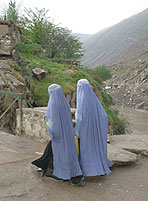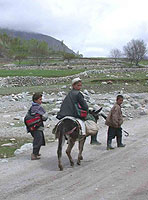|
Unlike most women in Afghanistan, those in the snowy northern valley of Sarghailan are having trouble finding husbands as educated as they are. Ebadullah Ebadi reports.
Badakhshan, Afghanistan - Squeezed between rocky mountains and covered in snow, Sarghailan valley in the northern district of Shohada in Badakhshan province faces many daunting problems, including hunger and preventable disease.
But the most recent problem confronting educated women in the valley is finding an equally educated husband.
DROP OUTS
In Sarghailan, many boys have to drop out of school in order to help their parents provide food for the family, while girls have a better chance of finishing their education.
This by no means reflects the situation in Afghanistan as a whole, where girls’ enrolment rates in school are among the lowest in the world, and far lower than the rates for boys.
UNEDUCATED BOYS
"Most of the boys in the village are uneducated, but the girls are mostly educated," says Baba Karim, a 65-year-old, white-bearded miller with a water-powered grinding mill in the village of Ezrew.
"This creates problems; when the women are educated they won’t marry uneducated men," he adds, sipping his green tea.
POSITIVE DEVELOPMENT
 It is, however, seen as a positive development by the women themselves. It is, however, seen as a positive development by the women themselves.
"I'm an educated woman, and I wouldn't like to marry an uneducated man," says Nazaneen Jabari, 24, who is proud of being a student at the only high school in Ezrew.
"I want to marry someone who is also educated."
TALIBAN REGIME
Under the Islamic fundamentalist Taliban regime, girls were not allowed in school, and many boys were not interested in attending the Madrasa religious institutions which provided the only education on offer.
Badakhshan was controlled by the Northern Alliance, rather than the Taliban, but a lack of schools, teachers and books, coupled with widespread displacement due to the civil war and a need for both boys and girls to work, meant that few children in the province received schooling.
Since the Taliban regime was uprooted in late 2001, more than five million Afghan children have returned to class.
But with large parts of the country – including the Sarghailan valley – ravaged by 30 years of conflict and suffering from extreme poverty, it remains extremely difficult to get an education.
BACK TO SCHOOL
In April 2002, WFP started to provide meals or take-home food rations to hundreds of thousands of Afghan students in support of the government’s “Back to School” campaign, to alleviate short-term hunger and encourage enrolment, attendance and school performance, especially among female students.
Primary school children in grades one to six are supplied with a monthly take-home ration comprising a 50kg bag of wheat and 4kg of cooking oil.
"My mother cooks fish in WFP vegetable oil for us to eat," says Sohaila, a nine-year-old schoolgirl in the second grade at Bibi Maisara school, a mud-brick building by the river.
MAKING A LIVING
 However, once the rations stop, many of the boys give up the classroom and try to make a living by working in the fields, or finding jobs with carpenters or mechanics. However, once the rations stop, many of the boys give up the classroom and try to make a living by working in the fields, or finding jobs with carpenters or mechanics.
Some flee to neighbouring Iran or Pakistan, where jobs can be easier to find.
Like many other villagers, Safiullah, a 16-year-old boy busy irrigating a wheat field, made it to sixth grade with help from WFP but says that after that he had to quit.
"We're poor," he says. "I couldn’t continue – I have to help my father in this," and he points at the fields, which are surrounded by cherry, walnut and apple trees.
BRIGHTER FUTURE
Fewer girls drop out of school in the valley, apparently because many parents prefer their daughters to continue their education even after the rations stop, in the hope that it will bring them a brighter future.
“Basic education brings important benefits, not only to individuals and their future families, but also to the society as a whole,” says Charles Vincent, WFP’s Country Director in Afghanistan.
“The rations act as an incentive to attract boys and girls to school, but the hope is always for communities to see education as an asset in itself for a better future and this seems to be happening in this village.
"I wish as the economy picks up more boys would also stay enrolled. After all, these girls need educated husbands!”
|